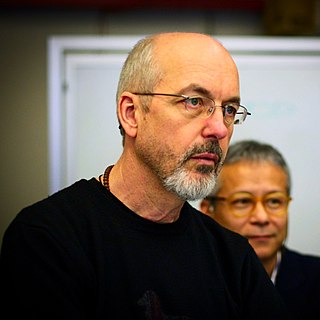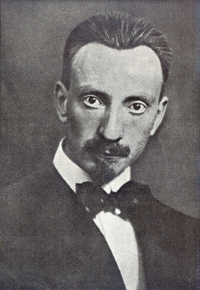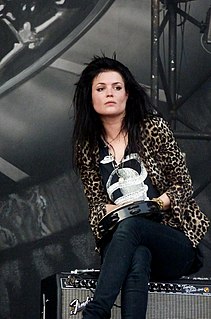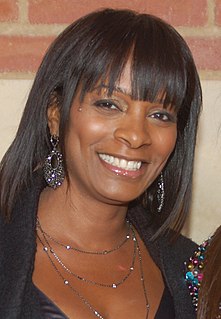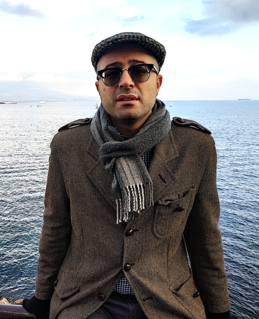Top 821 Idealism And Realism Quotes & Sayings - Page 14
Explore popular Idealism And Realism quotes.
Last updated on April 16, 2025.
You start out with big dreams and I mean, big dreams artistically. You want to work with the greatest living directors, make a great movie. I wanted to make a great love story, I wanted to make a great epic and then you realize that the truth of it is that it's so hard to make a great film. It's hard to get a great role. Those big expectations change to realism pretty quickly. But what's never changed is my desire to work with great directors and to find projects that push me out of my comfort zone and keep me alive. I still don't think I've done my best work
Well, I really want to encourage a kind of fantasy, a kind of magic. I love the term magic realism, whoever invented it – I do actually like it because it says certain things. It's about expanding how you see the world. I think we live in an age where we're just hammered, hammered to think this is what the world is. Television's saying, everything's saying 'That's the world.' And it's not the world. The world is a million possible things.
It is in the capacity to love, that is to SEE, that the liberation of the soul from fantasy consists. The freedom which is a proper human goal is the freedom from fantasy, that is the realism of compassion. What I have called fantasy, the proliferation of blinding self-centered aims and images, is itself a powerful system of energy, and most of what is often called 'will' or 'willing' belongs to this system. What counteracts the system is attention to reality inspired by, consisting of, love.
Fifty years from now I don't think optical realism is going to be an issue in visual communication any more. Experience is so much richer than light falling on your retina. You embody a microcosm of reality when you walk down the street - your memories, your varying degrees of awareness of what's going on around you, everything we could call the contextualizing information. Representing that information is going to be the main issue in the years ahead - how the world meets the mind, not the eye.
I just happened to have my camera and be photographing my friends. It was totally innocent; there was no purpose to the photographs. There was a purity to them that wasn't planned; it was realism. Over the years, the work has changed for me. I know that I have wanted to repeat myself, but I can't. I've been lost a lot of times, but then I'd just get an idea and photograph it. Once I'd started, I'd know exactly what would go down and how it would end. So I just quit doing it, because it loses all interest for me when you know what's going to happen.
We could speak about the meaning of life vis-a-vis non-consequential/deontological theories, apodictic transformation schemata, the incoherence of exemplification, metaphysical realism, Cartesian interactive dualism, revised non reductive dualism, postmodernist grammatology and dicey dichotomies. But we would still be left with Nietzsche's preposterous mustache which instills great anguish and skepticism in the brain, which leads (as it did in his case) to utter madness. I suggest we go to Paris instead.
I shall never forget what I saw at the Museum of Modern Art: in a spotless schoolroom, fifty little girls painting away at tables covered with brushes, pots, tubes, bowls, staring into space and sticking out their tongues like the clever animals that ring a bell, tongues lolling and eyes vague. Teachers supervise these young creators of abstract art and slap their wrists if what they paint represents something and dangerously inclines toward realism. The mothers - still at the Picasso stage - are not admitted.
Folk-lore means that the soul is sane, but that the universe is wild and full of marvels. Realism means that the world is dull and full of routine, but that the soul is sick and screaming. The problem of the fairy tale is: what will a healthy man do with a fantastic world? The problems of the modern novel is: what will a madman do with a dull world? In the fairy tales the cosmos goes mad; but the hero does not go mad. In the modern novels the hero is mad before the book begins, and suffers from the harsh steadiness and cruel sanity of the cosmos.
"Hard" science fiction probes alternative possible futures by means of reasoned extrapolations in much the same way that good historical fiction reconstructs the probable past. Even far-out fantasy can present a significant test of human values exposed to a new environment. Deriving its most cogent ideas from the tension between permanence and change, science fiction combines the diversions of novelty with its pertinent kind of realism.
You must try to combine in your life immense idealism with immense practicality. You must be prepared to go into deep meditation now, and the next moment you must be ready to go and cultivate the fields. You must be prepared to explain the intricacies of the scriptures now, and the next moment to go and sell the produce of the fields in the market....The true man is he who is strong as strength itself and yet possesses a woman's heart.
In order to succeed we need leaders of inspired idealism, leaders to whom are granted great visions, who dream greatly and strive to make their dreams come true; who can kindle the people with the fire from their own burning souls. The leader for the time being, whoever he may be, is but an instrument, to be used until broken and then to be cast aside; and if he is worth his salt he will care no more when he is broken than a soldier cares when he is sent where his life is forfeit in order that the victory may be won.
I favor the policy of economy, not because I wish to save money, but because I wish to save people. The men and women of this country who toil are the ones who bear the cost of the Government. Every dollar that we carelessly waste means that their life will be so much the more meager. Every dollar that we save means that their life will be so much the more abundant. Economy is idealism in its most practical form.
This man, who for twenty-five years has been reading and writing about art, and in all that time has never understood anything about art, has for twenty-five years been hashing over other people's ideas about realism, naturalism and all that nonsense; for twenty-five years he has been reading and writing about what intelligent people already know and about what stupid people don't want to know--which means that for twenty-five years he's been taking nothing and making nothing out of it. And with it all, what conceit! What pretension!
Beethoven and Wagner for many years wrung our hearts. But now we are sated with them and derive much greater pleasure from ideally combining the noise of streetcars, internal-combustion engines, automobiles, and bust crowds than from rehearsing, for example, the 'Eroica' or the 'Pastorale'...away! les ust be gone, since we shall not much longer succeed in restraining a desire to create a new musical realism by a generous distribution of sonorous blows and slaps, leaping numbly over violins, pianofortes, contrabasses, and groaning organs, Away!
Realism as a foreign policy doctrine means basically you don't care about values; you consider them a luxury, and it leads to a kind of acquiescence in spheres of influence. Now, spheres of influence sound good if you're a graduate student, or a certain kind of - an academic with a certain habit of mind. But in fact, spheres of influence don't work out very well, certainly not for the victims, and there are always victims.
There is the specter of "realism" that is still haunting Chinese contemporary art - that art is only an instrument, an instrument to reflect society, that it must be useful for society. Also, I have noticed many Western media outlets are very insistent on understanding contemporary art in China through this kind of realist approach. Sometimes I even sense that they are intent on, as we say in China, "picking bones of politics out of an egg of art." Or perhaps they see art as merely an instrument to reflect society.
It is not realistic or hard-headed to solve problems and take action unguided by ultimate moral aims and values, although we all know some who claim that it is so. In my judgement, it is thoughtless folly. For it ignores the realities of human faith and of passion and of belief; forces ultimately more powerful than all the calculations of our economists or of our generals. Of course to adhere to standards, to idealism, to vision in the face of immediate dangers takes great courage and takes self-confidence. But we also know that only those who dare to fail greatly, can ever achieve greatly.
Idealism, though just in its premises, and often daring and honest in their application, is stultified by the exclusive intellectualism of its own methods: by its fatal trust in the squirrel-work of the industrious brain instead of the piercing vision of the desirous heart. It interests man, but does not involve him in its processes: does not catch him up to the new and more real life which it describes. Hence the thing that matters, the living thing, has somehow escaped it; and its observations bear the same relation to reality as the art of the anatomist does to the mystery of birth.
Scholars, who pride themselves on speaking their minds, often engage in a form of self-censorship which is called "realism." To be "realistic" in dealing with a problem is to work only among the alternatives which the most powerful in society put forth. It is as if we are all confined to a, b, c, or d in the multiple choice test, when we know there is another possible answer. American society, although it has more freedom of expression than most societies in the world, thus sets limits beyond which respectable people are not supposed to think or speak.
But it does no good--solves nothing--to distance myself from the front lines of human need by using the mail as a safe shelter. I believe that serving the best ends of humanity means getting out in the middle of it just as it is, not staying home writing checks and thinking hopeful thoughts. The world does not need tourists who ride by in a bus clucking their tongues. The world as it is needs those who will love it enough to change it, with what they have, where they are. And you're damned right that's idealistic. No apology. When idealism goes into the trash as junk mail, we're finished.
I'm an anxious person in general, but something about being pregnant and awaiting the release of my first book, The Monsters Of Templeton, made me into an insane anxious person. I didn't sleep at night. I ended up sleeping all day. In a strange way I felt like the world was going to end. I found myself so deeply depressed at times that I started to read about happiness, and that took me into books about idealism and utopianism. Reading books about people who tried to build utopian societies of different kinds gave me a kind of lift.
[T]he next time you hear serious-sounding people explaining the need for fiscal austerity, try to parse their argument. Almost surely, you'll discover that what sounds like hardheaded realism actually rests on a foundation of fantasy, on the belief that invisible vigilantes will punish us if we're bad and the confidence fairy will reward us if we're good. And real-world policy - policy that will blight the lives of millions of working families - is being built on that foundation.
Wimsey stooped for an empty sardine-tin which lay, horribly battered, at his feet, and slung it idly into the quag. It struck the surface with a noice like a wet kiss, and vanished instantly. With that instinct which prompts one, when depressed, to wallow in every circumstance of gloom, Peter leaned sadly against the hurdles and abandoned himself to a variety of shallow considerations upon (1) The vanity of human wishes; (2) Mutability; (3) First love; (4) The decay of idealism; (5) The aftermath of the Great war; (6) Birth-control; and (7) The fallacy of free-will.
It was an honor to work with Samantha Morton on this Casablanca-esque, silent-film-esque, Americana photobooth Woolworth's hay day period piece of surrealism/ realism/ story time tell-tale-ism, black and white 35 mm film, washed in strange light, over this love hate tune, heartbreak song, life-goes-on lullaby, The Last Goodbye. It's a doorway into the future of the fatal past-tense. Get it?
Every decision a person makes stems from the person's values and goals. People can have many different goals and values; fame, profit, love, survival, fun, and freedom, are just some of the goals that a good person might have. When the goal is to help others as well as oneself, we call that idealism. My work on free software is motivated by an idealistic goal: spreading freedom and cooperation. I want to encourage free software to spread, replacing proprietary software that forbids cooperation, and thus make our society better.
There's nothing wrong with being proud of America, believing that America can do great things. America can do great things, it has done great things. I think we have to have the self-awareness to recognize that the world is a very, very big place, that we could be a force for good things in the world, but we have to have the humility to recognize that sometimes even when we think we're acting from the best of motives our own idealism can be infected by self-interest. Other people in other countries can see it sometimes better than we can.
To me, making a horror movie is about how you can present similar genre familiarities, but present them a little bit differently. Part of what interests me is the nonchalant realism of it, because you don't get that in the big studio horror movies. I like seeing someone walk around a house and sift through the drawers, and things like that, because that reminds me of what I would do, and of weird personal choices that people would make. That, in contrast to seeing someone get chased with a knife, makes it all the more interesting.
Henri-Georges Clouzot's cool, clammy, twisty 1955 thriller Diabolique is an almost perfect movie about a very nearly perfect murder, a film in which the artist's methods and the killers' are ideally matched, equal in cunning and in ruthlessness. The screenplay, adapted by Clouzot and three other writers from a novel by the crack French crime-fiction team of Pierre Boileau and Thomas Narcejac, is a fantastically elaborate piece of contrivance, but the scrupulous realism of the direction makes the unnatural tale somehow feel entirely likely.
Most literary critics agree that fiction cannot be reduced to mere falsehood. Well-crafted protagonists come to life, pornography causes orgasms, and the pretense that life is what we want it to be may conceivably bring about the desired condition. Hence religious parables, socialist realism, Nazi propaganda. And if this story likewise crawls with reactionary supernaturalism, that might be because its author longs to see letters scuttling across ceilings, cautiously beginning to reify themselves into angels. For if they could only do that, then why not us?
Abstract understanding doesn't mean arbitrary sloshing and messing. Abstract art is controlled visual magic based on laws and methodology. Abstraction generally involves implication, suggestion and mystery rather that obvious description. Like a good poem, a good abstraction attacks your feelings before your understanding. Abstraction within realism adds zest and excitement to otherwise dull subject matter. Abstract understanding takes time and patience.
I don't think I avoided being type cast, because I do sometimes get similar roles. It is not a bad thing because we are strong at what we are strong at, not meaning that we cannot do other things, but sometimes somebody else might bring a little more realism than you, because that is more of who they are than who you are. I do get a chance to play other people and other types of roles.
I think everybody who really wants to change things has to allow themselves to be angry in a constructive way, and you have to fully understand the thing you're trying to change. We really need to get serious about this now; there needs to be real, effective programs. I think there needs to be a little bit more strategy involved and a little more realism, to be pragmatic and realistic, looking at the way we as women contribute to the problem. Once the second half of the population stops doing it, it's going to end.
The Conquest is not a film about Nicolas Sarkozy - it's a film about political conquest. It's a Shakespearean expression, where we have all the elements of a drama, both political and personal at the same time. The decors and the costumes are all based on real photos - I wanted to be as close to reality as possible. Nicola Piovani's theatrical music gives a distance that's almost Chaplinesque, there's something quite funny. There's no imitation, no caricature, no parodie - it's realism with a distance where the dialogues are often quite funny.
I heard somebody open and shut the gate to the barn lot, but I didn't look around. If I didn't look around it would not be true that somebody had opened the gate with the creaky hinges, and that is a wonderful principle for a man to get hold of... What you don't know know don't hurt you, for it ain't real. They called that Idealism in my book I had when I was in college, and after I got hold of that principle I became an Idealist... If you are an Idealist it does not matter what you do or what goes on around you because it isn't real anyway.
I don't like realism. We already know the real facts about li[fe], most of the basic facts. I'm not interested in repeating what we already know. We know about sex, about violence, about murder, about war. All these things, by the time we're 18, we're up to here. From there on we need interpreters. We need poets. We need philosophers. We need theologians, who take the same basic facts and work with them and help us make do with those facts. Facts alone are not enough. It's interpretation.
As a director, I have to feel realism from actors, and they can't be plastic. The words for me are secondary, but the chemistry between the actors is most important. However, you have to go by the script because it's related to production, otherwise you will not finish your project. My background are acting, film production, directing, and I studied them for many years. Keep in mind that you need many other skills when you are starting any film project related to real life.
I'm not talking about blind optimism, the kind of hope that just ignores the enormity of the tasks ahead or the road blocks that stand in our path. I'm not talking about the wishful idealism that allows us to just sit on the sidelines or shirk from a fight. I have always believed that hope is that stubborn thing inside us that insists, despite all the evidence to the contrary, that something better awaits us so long as we have the courage to keep reaching, to keep working, to keep fighting.
India went through a dramatic revolution after the '90s when our economy started opening up for the first time and Indians were now experiencing the Western life, if you will. Drugs and sex and a lot of those influences came in as the economy stabilized, and we were growing up and experiencing that. The Indian writing market was very small at that time. Our literature was very attuned to what Western audiences were interested in, so everybody was writing about the slums in India and magic realism or stories about Hindus and Muslims and partition.
I dream about speaking in big forums about issues that need to be spoken about. I dream about helping others who I know and love, helping them realize their dreams. I dream about being able to express myself through acting and writing, definitely. I dream about bringing more realism into the world. Sometimes I just feel like certain things are so glossed over and covered up and swept under the rug and I just want to bring them out.
Gorecki, you know, there's a kind of personal thing there for me. I had, you know, kind of become obsessed with that sort of Soviet Bloc period. And actually, a lot of composers in the Soviet Bloc - Gorecki's not the only one - are writing for the harpsichord as a sort of reaction against enforced Soviet realism, expressionism, sort of enforced modernism.
Political realism is aware of the moral significance of political action. It is also aware of the ineluctable tension between the moral command and the requirements of successful political action. And it is unwilling to gloss over and obliterate that tension and thus to obfuscate both the moral and the political issue by making it appear as though the stark facts of politics were morally more satisfying than they actually are, and the moral law less exacting than it actually is.



